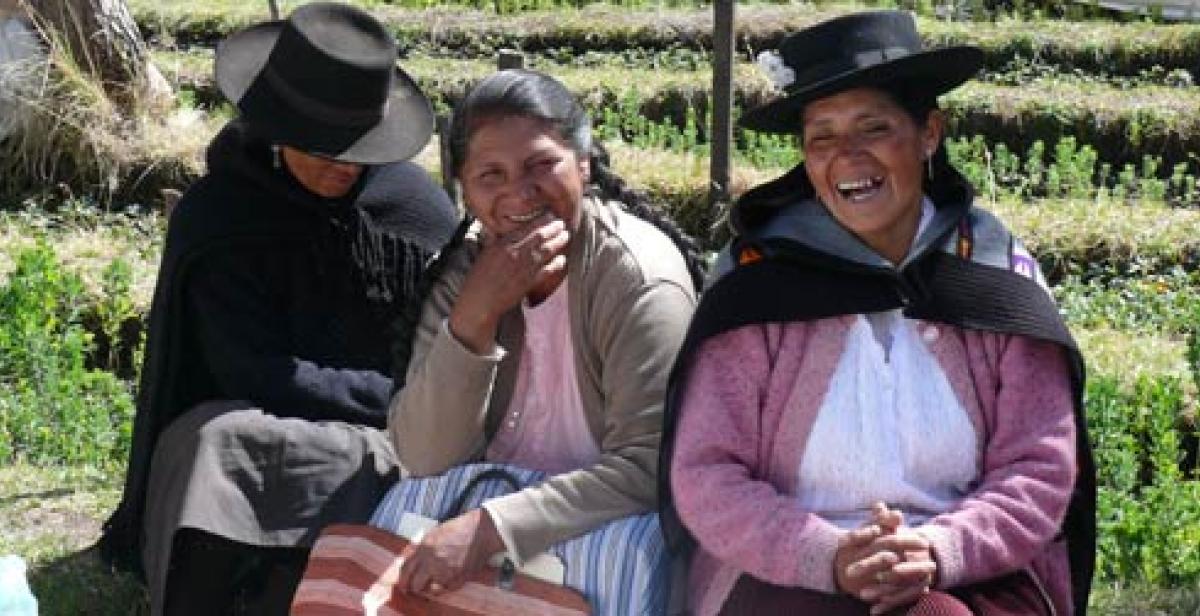Cindy Krose writes from Huancavelica, Peru:
For a video on this topic by Cindy in Huancavelicas, click here.
Women in the rural district of Huancavelica prepare the food for the family, do the domestic tasks, take care of the animals, and on top of this (together with the men) are in charge of many of the agricultural practices that sustain the family.
Yet up till now, these women have not been listened to, and have not had a voice in the policies and decisions that affect their lives.
Politics for men
For many years in Peru, the national politics has been led by men, and the majority of public and political positions have been held by men. Women were thought to belong to the domestic and productive sphere but not the political one.
Political participation of women in the rural sector is even more limited, and they have had almost no say on the regional policies and local decisions regarding the use and management of the natural resources that they depend upon.
No place for rural women
In Huancavelica, for example, of the 19 district mayor’s offices, only two are run by women.
As Lida Castro, who works on capacity buliding for women with the organisation Manuela Ramos in Huancavelica, told me: “Women do not have real political participation in Huancavelica.”
There are many factors that limit the participation of rural women. Up until 2002 the rate of illiteracy among women in the rural sector still reached 37.4% and 312,000 women, mostly in rural areas, do not have a document that identifies them and permits them to vote. Discrimination, violence against women, language barriers, and differentiated treatment has been the rule.
Poverty and climatic threats
In Huancavelica, 84% of the population lives in poverty, and 62% in extreme poverty. Most people in Huancavelica subsist from small scale agriculture and herding – and women play a key role in this.
The Andean people have always been faced with climatic extremes – in fact, the levels of poverty are due in part to the exposure of the population to multiple climatic threats.
Over the years, the people have been able to survive in very difficult conditions by adapting their agricultural and herding practices to the climatic variability of their natural environment. Nevertheless, for the last decade, farmers in Peru have witnessed accelerated changes in their natural environment that can be related to the process of climate change. The farmers have to respond quickly because their means of subsisting are put at risk.
Adapting to climate change
Both men and women can already feel the changes in their daily lives. It has become more difficult to grow the necessary quantity of food, obtain a balanced variety of crops and keep the crops and animals alive.
One of the major changes already felt today is irregularities in access to water for domestic and farming use, caused by the melting of the ice caps and changes in the rainfall patterns. Farmers need to find new ways to use and manage the water – and the Peruvian government and its regional and local representatives must support them in doing this, and involve them in the process of finding solutions.
Rural women find a voice
Progressio’s partner organisation CEPES has been working in Huancavelica for more than 10 years. In 2010 CEPES initiated a project with women from four districts in Huancavelica. On the one hand the project supports local communities with information and tools to respond to the climatic threats through a more efficient management and use of their natural resources.
On the other hand the project seeks to strengthen the participation of small scale farmers, especially women, in public spaces and decision-making processes concerning the local and regional management of natural resources.
Projects like these bring positive changes for rural women. One example is an increase in the proposals that are being presented by rural communities to the local, regional and national authorities.
We won't be marginalised
During my last trip to Huancavelica I was able to meet Victoria Cruz, president of the FEDECLUMA Federation of Mothers' Clubs of Huancavelica. She is the leader of one the few women's organisations in the region - and certainly the largest, with 22,000 members across five provinces of Huancavelica.
Together with the members of the federation they lead reforestation projects and collective efforts to manage and protect the natural resources. They generate employment, organize themselves and have a say in the local politics and projects that are being implemented.
She pointed out that "women are always marginalised, but our organisation has managed to create an important space of participation for women - but it was not easy." She also emphasised that it is not easy to be a leader and that there are many obstacles that make the work more difficult, amongst others: domestic violence, discrimination and high levels of illiteracy among women.
We need to do more
It therefore necessary to further promote the political participation of the rural population at the national level – and more specifically women. Women too have the right to have a say on the use that is given to their natural resources, and to take part in the decisions on what should be prioritised in order to help the rural population adapt in this context of climatic unpredictability.
Cindy Krose is a Progressio development worker in Peru
Photo: Victoria Cruz (right) with other members of the Federation of Mothers' Clubs of Huancavelica. (Photo © Cindy Krose/Progressio)



